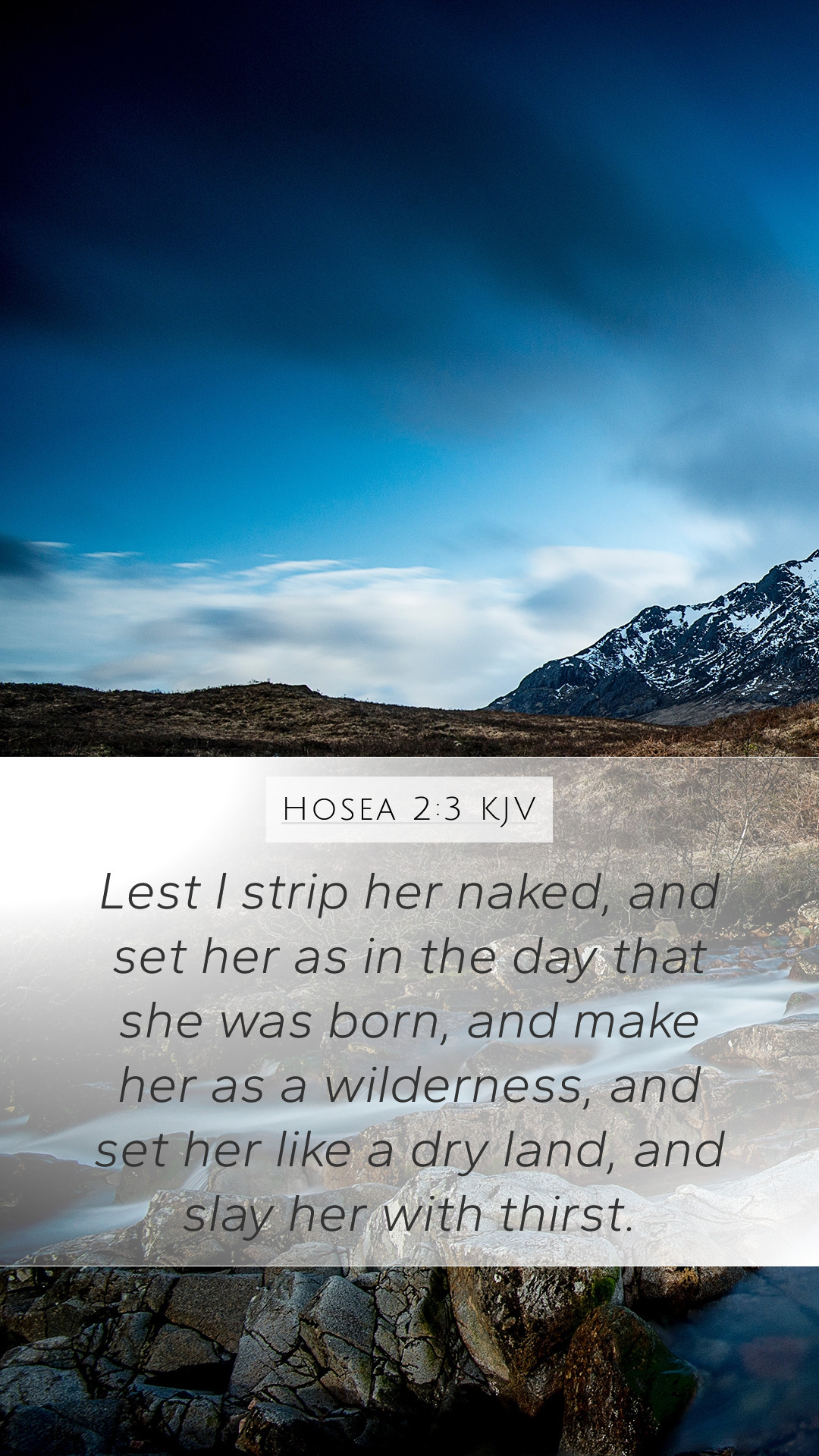Old Testament
Genesis Exodus Leviticus Numbers Deuteronomy Joshua Judges Ruth 1 Samuel 2 Samuel 1 Kings 2 Kings 1 Chronicles 2 Chronicles Ezra Nehemiah Esther Job Psalms Proverbs Ecclesiastes Song of Solomon Isaiah Jeremiah Lamentations Ezekiel Daniel Hosea Joel Amos Obadiah Jonah Micah Nahum Habakkuk Zephaniah Haggai Zechariah MalachiHosea 2:3 Meaning
What is the meaning of Hosea 2:3?
Lest I strip her naked, and set her as in the day that she was born, and make her as a wilderness, and set her like a dry land, and slay her with thirst.
Hosea 2:3 Bible Verse Meaning
Bible Verse Commentary on Hosea 2:3
Bible Verse: Hosea 2:3
Verse Text: "Lest I strip her naked, and set her as in the day that she was born, and make her as a wilderness, and set her like a dry land, and slay her with thirst."
Overview and Context
Hosea, a prophet in the Old Testament, utilizes vivid imagery in this verse to illustrate the consequences of Israel's infidelity to God. The larger context of the Book of Hosea focuses on Israel's unfaithfulness, their idolatry, and the resulting judgment that God will bring upon them. This verse reveals God's intentions and the severity of the situation, emphasizing His displeasure and the drastic actions He may take.
Verse Meaning and Interpretation
- Divine Judgment: Matthew Henry's commentary emphasizes that the stripping naked symbolizes the removal of all comforts, protections, and blessings that God had provided to Israel. The wilderness represents desolation and abandonment, signifying the spiritual barrenness Israel would face without divine favor.
- Consequences of Unfaithfulness: Adam Clarke highlights that the stripping reflects how Israel has behaved unfaithfully, likening it to a wife who is disloyal to her husband. The imagery of nakedness not only represents humiliation but also the exposure of their sins—Israel is laid bare before God.
- Symbolism of Thirst: Albert Barnes points out that thirst symbolizes a deep yearning and need for spiritual sustenance. In this context, it suggests that apart from God, Israel would face starvation of the soul, leading to spiritual death.
- Warning and Restoration: The removal of blessings serves a dual purpose—while it is a warning of judgment, it also points to the possibility of repentance and restoration. The fatherly discipline from God is aimed at leading His people back to Him.
Key Themes
- Faithfulness to God: The necessity for Israel to return to genuine worship and commitment to their covenant with God is a recurrent theme. This is also reflective of a broader biblical principle seen throughout Scripture.
- The Nature of God’s Love: Even in judgment, the ultimate goal of God's actions is rooted in His love for His people. The process of stripping away is to bring Israel back to a place of acknowledgment and dependence on Him.
Practical Applications
Understanding the implications of Hosea 2:3 can help believers reflect on their relationship with God. Questions to consider include:
- Are there areas of my life where I am unfaithful to God? Self-assessment in light of Scripture can lead to spiritual growth and healing.
- Is there a spiritual thirst that I am trying to satisfy with worldly things? Recognizing true spiritual needs can lead to seeking God as the source of living water.
Related Scripture Cross References
- Isaiah 54:1-3 - Discussion of desolation and restoration.
- Ezekiel 16:35-43 - God's judgment on unfaithfulness.
- Revelation 3:17-19 - The consequences of being lukewarm in faith.
Conclusion
Hosea 2:3 serves as a poignant reminder of the consequences of spiritual unfaithfulness while simultaneously highlighting God's desire for reconciliation. Its profound imagery invites deep Bible verse understanding and interpretation within the context of both judgment and love.


